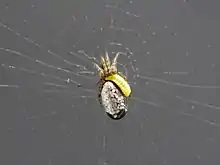Reclinervellus nielseni
Reclinervellus nielseni is one of the spider-ectoparasitoids belonging to the Polysphincta genus-group (Hymenoptera, Ichneumonidae, Pimplinae) and utilizes exclusively Cyclosa spiders (Araneae, Araneidae) as hosts. The species is distributed from Britain to Japan but is rather sparse. Host spider species is different in accordance with the region, that is Cyclosa conica in Europe whereas Cyclosa argenteoalba in Japan.
| Reclinervellus nielseni | |
|---|---|
 | |
| A larva of R. nielseni parasitizing C. argenteoalba in Japan. | |
| Scientific classification | |
| Domain: | Eukaryota |
| Kingdom: | Animalia |
| Phylum: | Arthropoda |
| Class: | Insecta |
| Order: | Hymenoptera |
| Family: | Ichneumonidae |
| Subfamily: | Pimplinae |
| Tribe: | Ephialtini |
| Genus: | Reclinervellus He & Ye, 1998 |
| Species: | R. nielseni |
| Binomial name | |
| Reclinervellus nielseni (Roman, 1923) | |
| Synonyms | |
| |
Host manipulation [2]
Reclinervellus nielseni is known to manipulate web-building behavior of the host spider (Cyclosa argenteoalba) to modify an original fragile orb-web into a simple and durable web with conspicuous web decorations. The modified web is derived from a pre-programmed resting web constructed before spiders' molting, verified by the conformity of web shape and the presence of specific web decoration. The web decorations are thought to serve as a web-advertiser toward flying potential web destroyers (birds and insects). The web is conspicuous under ultraviolet light, and stronger than the typical resting web.[3] Although the molting web structure usually only the two days the spider takes to molt, the larvae remain within their spider-cocoon for up to ten days before hatching. [4]
References
- "Reclinervellus nielseni (Roman, 1923)". Catalogue of Life. Species 2000: Leiden, the Netherlands. Retrieved 8 October 2023.
- Takasuka, Keizo; Yasui, Tomoki; Ishigami, Toru; Nakata, Kensuke; Matsumoto, Rikio; Ikeda, Kenichi; Maeto, Kaoru (2015-08-01). "Host manipulation by an ichneumonid spider ectoparasitoid that takes advantage of preprogrammed web-building behaviour for its cocoon protection". Journal of Experimental Biology. 218 (15): 2326–2332. doi:10.1242/jeb.122739. ISSN 0022-0949. PMID 26246608.
- Knight, Kathryn (1 August 2015). "Wasp masters manipulate web-building slaves". Journal of Experimental Biology. 218 (15): 2315–2315. doi:10.1242/jeb.128678. Retrieved 14 April 2023.
- Mitchell, Elizabeth. "Fear the Parasitic Wasp: Spider Zombies Caught in Web of Deceit". Answers in Genesis.